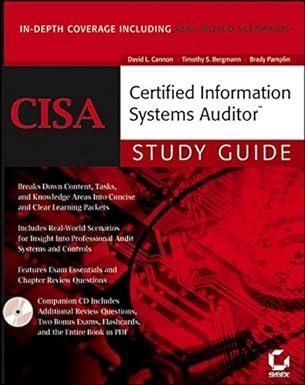Question
Wendover Fashions The purpose of this problem is to combine concepts from different chapters into a single problem. Thus, you will find in this problem
Wendover Fashions The purpose of this problem is to combine concepts from different chapters into a single problem. Thus, you will find in this problem transactions for notes & interest, bad debts, merchandise inventory, plant assets, and accruals and deferrals. Lori Sweat owns Wendover Fashions, a small and successful firm. She uses the allowance method for bad debts, FIFO valuation for its periodic merchandise inventory system, and the straight method to depreciate plant assets on a monthly basis. Relevant account balances as of December 1, 20Xl, are as follows: Account Debit Credit Allowance for Doubtful Accounts $3,200 Accounts Payable Empire Company $350 Livingston Company 950 Jesse Zealiff 800 Directions: 1. Record all the following selected transactions in a general journal. Dec. 1 Issued Check No. 110 to Black Company for a 9%, 120-day note due today. t The face value of the note is $1,500. Dec.1 Received a 90-day, 8% note for $2,400 from Jed Kissell as partial payment on account Dec. 4 Purchased office equipment on credit from Modem Equipment Company For $1,800, plus freight charges of $95' and an installation charge of $ 180. Dec. 5 The equipment purchased on December 4 was damaged in ne process of installation. Issued Check No. 111 to Ms. Fixit Co. for the amount of the repair, $155. Dec. 7 A note from Pat Sterns for $3,000 that was due today was dishonored When it was presented for payment. The 60-day note carried interest at 12%. Dec. 8 Wrote off the account of Peg Fuller for $2,600. Dec. 9 Purchased merchandise from Evans Company as follows: l,200 units & $10; terms, 2/ l0, n/30. Dec. 10 Issued Check No. 112 to pay Livingston Company the December 1 balance due, less a 1% discount. Dec. 11 Issued Check No. 113 to increase the petty cash fund by $200. Dec. 12 Collected a 120-day, 11% note with a face value of $6,000 due today. Dec. 16 Sold an item of store equipment that cost $2,800 and had been depreciated through the end of November at the rate of $40 a month for a total depreciation of $1,920. Received cash of $790 for the sale. Dec.16 Borrowed $8,000 by issuing a 30-day, 8% note. Dec.17 Issued Check No. 114 to pay Empire Company for the December 1 balance. Dec.18 Issued Check No. 115 to pay the purchase of December 9. Dec. 20 Carol Davis, whose account was written off last year, paid the $750 balance due to us. Reinstated the account and recorded the collection. Dec. 24 Purchased merchandise from Evans Company as follows: 1,000 units @ $10.20; terms 2/10, n/30. Dec.26 Issued Check No. 117 to the owner for a cash withdrawal of $500. Dec. 31 Recorded interest accrued on the note of December 1. Dec.31 Adjusted for merchandise inventory. A total of 1,700 units are on hand. There was no beginning inventory. Dec.31 Recorded accrued salaries. Weekly salaries for a five-day week amount to $45,000. The year 20X1 ended on a Monday, with salaries to be paid the following Monday. Dec. 31 Recorded insurance expired, $300. Insurance is recorded initially as an asset. Dec. 31 Recorded interest accrued on the note issued on December 16. Dec. 31 Aged the accounts receivable and adjusted the Allowance for Doubtful account to a balance of $3,900. Record all the following selected transactions in a general journal. Calculate the Net Realizable Value as of December 31. Accounts Receivable balance is $10,000 as of December.
Step by Step Solution
There are 3 Steps involved in it
Step: 1

Get Instant Access to Expert-Tailored Solutions
See step-by-step solutions with expert insights and AI powered tools for academic success
Step: 2

Step: 3

Ace Your Homework with AI
Get the answers you need in no time with our AI-driven, step-by-step assistance
Get Started


